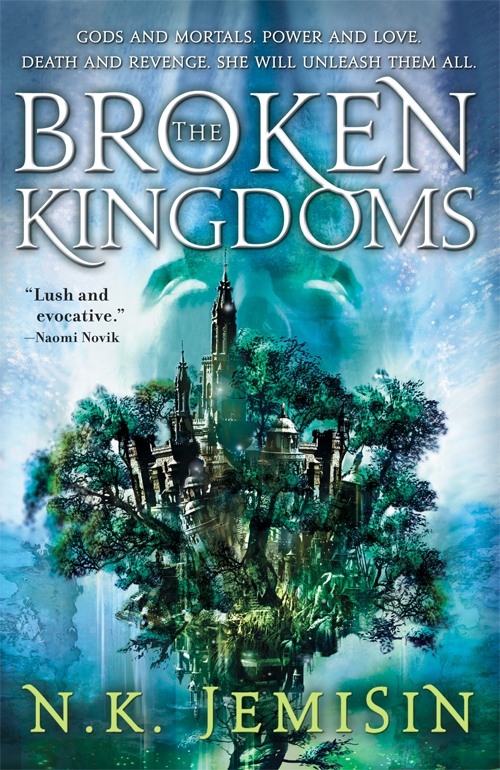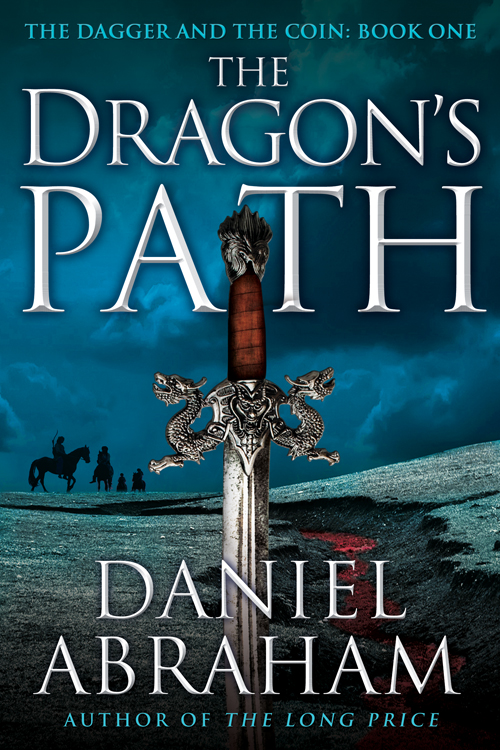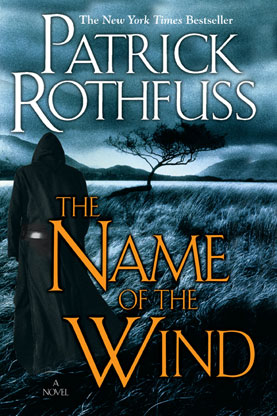 The Broken Kingdoms, the second book in N.K. Jemisin's Inheritance Trilogy, is, simply put, wonderful. Jemisin has crafted an intelligent, entertaining and, ultimately, heartbreaking sequel to The Hundred Thousand Kingdoms.
The Broken Kingdoms, the second book in N.K. Jemisin's Inheritance Trilogy, is, simply put, wonderful. Jemisin has crafted an intelligent, entertaining and, ultimately, heartbreaking sequel to The Hundred Thousand Kingdoms. It begins ten years after the events in The Hundred Thousand Kingdoms. The Arameri family still rules the palace of Sky and all of the hundred thousand kingdoms of the world; however, a giant tree grows through the middle of the palace, and the city that hus sprung up at the foot of the Tree is called Shadow. Bright Itempas - once the only god worshipped of the Three - must contend with the worship of other gods, particularly two new ones, the Lord of Shadows and the Gray Lady. It is a time of change in the world.
Oree Shoth, a blind artist with a gift for painting who sells her trinkets and baubles in a market in Shadow, one day finds what appears to be a godling - one of the many children of the Three - in a muckbin. Oree has two gifts, really: painting, and the gift of sight through use of magic. She can follow godling footsteps, make outlines of them in the darkness of her world - when magic is used around her, Oree can see. Here is how Jemisin describes Oree seeing the godling, whom she's nicknamed "Shiny", one morning: "...he turned his gaze outward again, his hair and shoulders beginning to shimmer. Next I saw his arms, as muscled as any soldier's, folded across his chest. His long legs, braced slightly apart; his posture relaxed, yet proud. Dignified. I had noticed from the first that he carried himself like a king."
Shiny does not speak - not at first. Oree and he carry on a muted existence with Shiny constantly unaware of the dangers of his mortal-like body. Oree must clean up the blood of one of his fatal accidents more than once, but always, Shiny resurrects, emotionless and distant to his surroundings. It is not until Oree finds a godling murdered - a thing thought impossible - in an alley near her market that Shiny shows any outward sign of emotion. From here, The Broken Kingdoms spirals into the world of Shadow: against heretical and non-heretical priests of the Order of Itempas, down through godlings (one of whom was once Oree's lover), into the palace of Sky where Oree is burdened with a heavy revelation about herself, into darkness where one of the weirdest conglamarations of a demon ever written awaits.
It is the relationship between Shiny and Oree, however, that is at the heart of The Broken Kingdoms: how Shiny's disdain for mortalkind becomes begrudging respect and then, perhaps, something more; how Oree's initial dislike of Shiny's carelessness with his own body and his arrogance changes as she changes, discovering more about herself and the mystery of who and what Shiny really is. Jemisin seems very interested in understanding the differences and similarities of love and hate, and where the two collide.
It is the relationship between Shiny and Oree, however, that is at the heart of The Broken Kingdoms: how Shiny's disdain for mortalkind becomes begrudging respect and then, perhaps, something more; how Oree's initial dislike of Shiny's carelessness with his own body and his arrogance changes as she changes, discovering more about herself and the mystery of who and what Shiny really is. Jemisin seems very interested in understanding the differences and similarities of love and hate, and where the two collide.
There is also a lot of action in The Broken Kingdoms, yet Jemisin retains a meditative-like tone throughout. Her prose is clean and cool and, though she is working on a large canvas, her world-building rings true and nothing is unclear by novel's end. The voice of the story, however, really belongs to Oree. She is a strong, sympathetic character and Jemisin endears her to us. Though blind, she sees more than a person with perfect sight; yet, she is also flawed, blind to her own past. The aforementioned "heavy revelation" only adds to her complicated, interesting personality.
It's often said that the middle book of a trilogy is the least cohesive, it having to tie up loose ends from the first book while also threading new plot twists to be tied up in the concluding book. Jemisin avoids these pitfalls by letting the books stand alone, though reading them in order (her third, The Kingdom of Gods is due out later this year from Orbit) one can see her deft world-building and carry-over threads working gloriously. Recommended.
(Also recommended, The Hundred Thousand Kingdoms, the first book in the Inheritance Trilogy.)
-Dustin Monk
(Also recommended, The Hundred Thousand Kingdoms, the first book in the Inheritance Trilogy.)
-Dustin Monk











